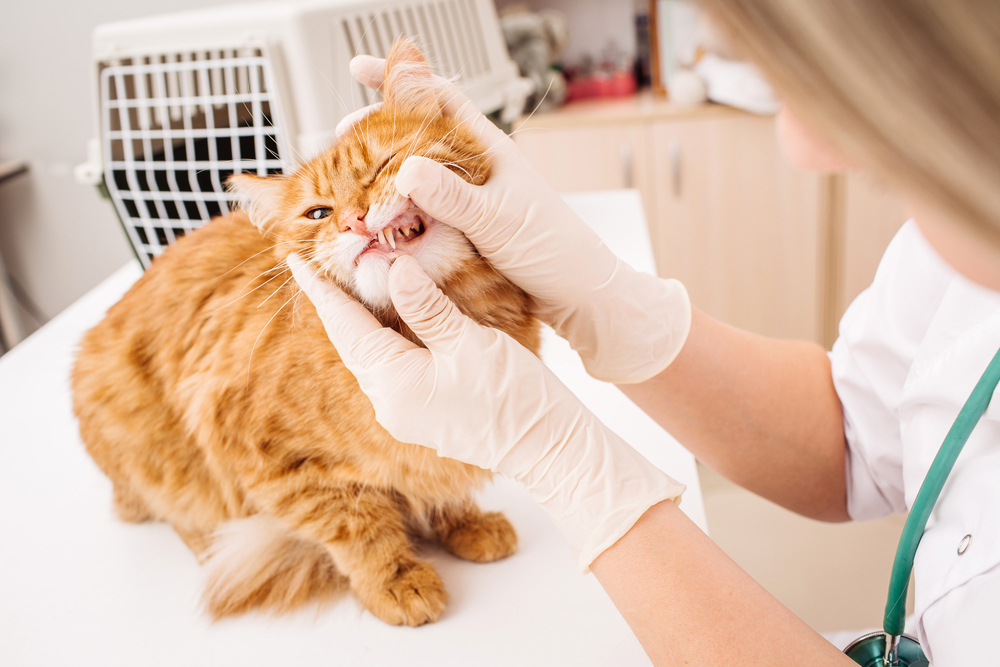Many New Year’s resolutions focus on health and fitness, so why not include your pet in your 2020 goals? Regular veterinary care, including annual wellness exams, blood work, and dental cleanings, will keep your pet healthy, and help us detect health issues before they progress to more serious problems. Commit to making your pet’s health a priority next year, and providing the critical wellness care she deserves.
Annual wellness examination for your pet
You pet should be examined by our veterinary team at least annually until she is 8 years old, at which point exams should increase to every six months. A wellness exam will include the following important checks:
- Weight check — We will weigh your pet and compare her current weight to previous visits. If your pet has unintentionally lost weight, we will look closely at possible reasons for the unexplained loss, such as mouth pain or systemic disease. If your pet has become overweight, we will discuss weight-loss strategies to prevent weight-related disease development.
- Physical exam — We will perform a thorough physical exam to evaluate each of your pet’s body systems. Unfortunately, many diseases cause subtle clinical signs that can be detected only by your veterinarian’s trained eyes, ears, and hands. Regular examination is critical to detect problems before they progress to an untreatable stage.
- Vaccination — Disease prevention is one of the most important components of wellness care, and routine vaccination is critical to keep your pet healthy. In addition to core vaccines, such as rabies, parvo, and distemper, we will determine whether your pet should receive other vaccines, based on her exposure risk.
- Parasite prevention — Parasites, such as fleas and ticks, are more than an annoying nuisance—they can carry dangerous diseases that they can transmit to your pet via a bite. Heartworms, which can be contracted from a mosquito bite, are another threat that can cause severe disease and death. Intestinal parasites are not typically as dangerous, but they can cause severe gastrointestinal upset, particularly in young animals. Fortunately, we can administer preventive medications to avoid these problems in your pet.
Annual blood work for your pet
Although the physical exam we perform during your pet’s annual wellness visit can help us detect some disease signs, many health conditions cause no obvious clinical signs, and can be detected only with in-depth testing. Annual blood work allows us to thoroughly screen for disease, so diagnosis can occur before illness becomes advanced. Routine blood work tests may include:
- Complete blood count (CBC) — A CBC measures the amount of red and white blood cells and platelets in your pet’s blood, and compares them to normal established values. Abnormalities in blood-cell numbers can indicate problems such as infection, anemia, and blood-clotting disorders.
- Blood chemistry — A blood chemistry test measures the levels of various chemicals produced by your pet’s organs, and provides valuable information about their function. Alterations in blood chemistry values can help us diagnose disease conditions such as kidney failure, liver failure, and diabetes.
- Heartworm test — Dogs should be tested annually to ensure they are free from deadly heartworms. After we confirm that your pet is negative, preventive medication will keep her heartworm-free.
Your pet’s blood work results will be analyzed, and if abnormalities indicate disease presence, we may recommend further testing to reach a diagnosis.
Routine dental cleaning for your pet

Dental disease is the most common health condition to affect pets, and without routine dental care, development is inevitable. Oral bacteria produce a sticky film called plaque that coats the tooth surface and mineralizes to tartar if not regularly removed by brushing. Only a professional dental cleaning can remove tartar, which, if allowed to accumulate, can spread below the gum line to also affect the tooth root. Dental disease that progresses can lead to tooth-root infection, loosening, and loss. Dental disease is painful, and affected pets often are in constant pain that owners may not notice.
We recommend annual dental cleaning to keep your pet’s teeth healthy and disease-free. We perform a dental cleaning under anesthesia to allow a thorough examination of your pet’s teeth and oral cavity, and a complete cleaning of all tooth surfaces above and below the gum line. If advanced dental disease is present, affected teeth can be extracted during the procedure to alleviate pain and discomfort.
Make 2020 the year you commit to your pet’s lifelong health. Contact us with questions about your pet’s routine health care, or to schedule her annual wellness exam.







Leave A Comment